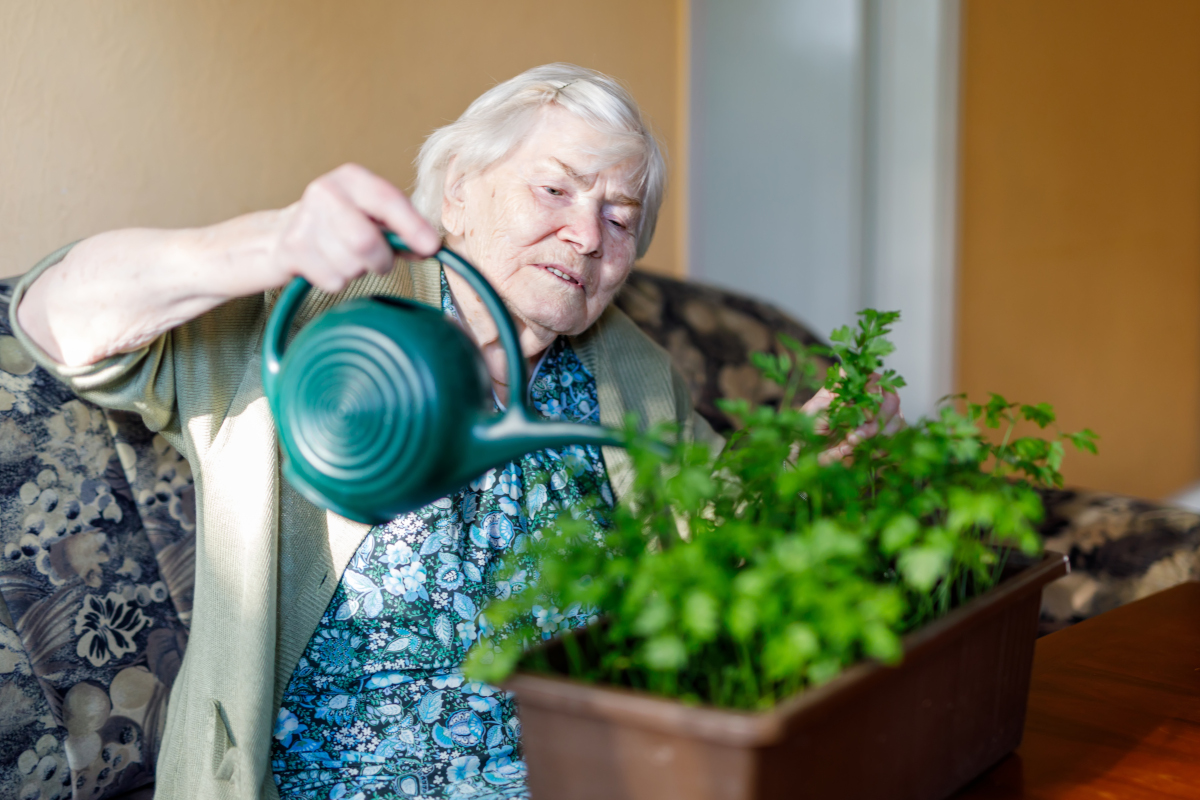Gardening is an enjoyable and rewarding pastime that people of all ages can enjoy. For seniors in assisted living facilities, gardening offers numerous physical, mental, and social benefits.
Older adults who garden are motivated to move more. Exercise helps reduce the risk of Type 2 diabetes, heart disease, and some cancers. They are also more likely to spend time outside in the fresh air and sunshine, which is an excellent source of vitamin D.
Community gardens also create opportunities to socialize. Assisted living residents can come together to engage in a shared hobby. It’s a great conversation starter that could help seniors form lasting friendships with their neighbors.
Growing fruits and vegetables also create more ways to connect. They can share their harvest with visitors or fellow residents.
A hobby like gardening also gives older adults a sense of purpose and accomplishment. This is essential to preventing depression.
Depression in elderly populations is a serious concern. Health problems, isolation, and life changes can increase the risk of mental health issues. Unfortunately, a Mental Health America survey found that 68% of adults over age 65 knew little or nothing about depression. Only 38% viewed it as a health problem.
The best way to deal with mental and physical conditions is to live a healthy, active lifestyle that prevents them. Gardening is a wonderful way to take a step closer to that goal.
Woodhaven Retirement Community wants to help all older adults find ways to live better and healthier this year. Gardening is a great way to start.
The Physical Benefits of Spring Gardening
It can help to take a closer look at the physical benefits of spring gardening. Even those with limited mobility can use gardening as motivation to move more. It is an activity that can be done sitting or standing.
- Improved Physical Fitness for Seniors
Gardening offers a low-impact form of exercise that can help seniors maintain their physical fitness. Digging, planting, and watering are all activities that require movement and strength, which can improve muscle tone, flexibility, and overall physical health. Gardening can help seniors maintain their balance and coordination, as they navigate uneven terrain and perform various tasks.
- Lower Risk of Heart Disease and Stroke
Regular physical activity, such as gardening, can help reduce the risk of heart disease and stroke. Physical activity improves the cardiovascular system. Gardening is a great low-impact way to start strengthening your body. It can be a helpful alternative for seniors who cannot perform more intensive exercises.
- Reduce Arthritis Pain
When done safely, gardening can help alleviate arthritis pain. It’s a good form of exercise that requires muscle movement. Make sure you use ergonomic gardening tools and avoid strenuous movements. You can also try these 8 things you can do now to alleviate arthritis pain.
- Improve Bone Density
We start to lose bone faster than our bodies can build it after age 50. Gardening can help improve bone density in seniors. Weight-bearing activities, such as walking and lifting, can help to maintain bone strength. Seniors are at a higher risk for bone fractures and osteoporosis. Activities like gardening can help lower that risk.
How Gardening Helps Senior Mental Health
Gardening can also have a profound impact on senior mental health. Doing it regularly can help lift a person’s mood, give them a sense of purpose, and encourage them to socialize. How can gardening promote a healthy mental state?
- Stress Relief and Relaxation
The act of gardening can be a therapeutic and calming experience for seniors. Being outdoors and surrounded by nature can help to reduce stress levels and promote relaxation. The satisfaction of nurturing plants and watching them grow can provide a sense of accomplishment and purpose.
- Improved Cognitive Function
Research has shown that engaging in mentally stimulating activities can help to maintain healthy cognitive function in seniors. Gardening requires problem-solving, planning, and decision-making skills, which keep the mind sharp and focused. Learning new gardening methods and discovering plant species is also great for mental stimulation.
- Reduced Depression and Anxiety
Gardening reduces the symptoms of depression and anxiety in seniors. The combination of physical activity, exposure to nature, and social interaction can all contribute to improved mental wellbeing.
- Promotes Healthy Sleep Patterns
Gardening gets seniors under the sun, which trains the body to be active during the daytime. It also consumes energy, which helps the body relax during the evening hours. After being awake and active all day, an older adult is more likely to get better, deeper sleep at night. If you have trouble sleeping, you can also try these 10 tips that help seniors get better sleep.
Gardening for Seniors with Alzheimer’s and Dementia
Gardening also has many benefits for seniors with Alzheimer’s disease and dementia.
- Sensory Stimulation
Gardening can provide a sensory-rich environment for seniors with Alzheimer’s and dementia. The sights, smells, and textures of a garden stimulate the senses and promote cognitive function. Familiar gardening tasks can also evoke happy memories of the past, which create a sense of comfort and familiarity.
- Structured Activities
Gardening can provide structured activities for seniors with Alzheimer’s and dementia. By participating in regular gardening tasks, such as watering or pruning, seniors can maintain a sense of routine, which can help to reduce feelings of disorientation and confusion.
- Social Interaction
Gardening provides opportunities for social interaction for seniors with Alzheimer’s and dementia. By working together on a shared project, seniors can develop friendships and support networks. These social interactions help prevent feelings of loneliness and isolation.
Gardening offers numerous benefits for seniors in assisted living facilities, from improved physical and mental health to increased social interaction and community involvement. By incorporating gardening into their daily lives, seniors can enjoy the many rewards of this fulfilling and therapeutic pastime. With the arrival of spring, there’s no better time for seniors to get their hands dirty and discover the joys of gardening.

